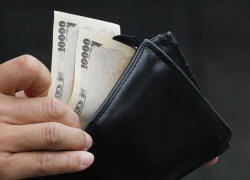|
Yen sheds post-Brexit
gains as Japan stimulus hopes boosts risk play
 Send a link to a friend
Send a link to a friend
 [July 12, 2016]
By Anirban Nag [July 12, 2016]
By Anirban Nag
LONDON (Reuters) - The yen hit its
lowest in nearly three weeks against the dollar on Tuesday and shed
1.4 percent versus the euro, as a weekend election victory by
Japan's ruling coalition paved the way for more stimulus, bolstering
risk sentiment.
Gains in global stock markets saw investors cut holdings in the yen,
which rose on safe-haven demand after Britain's vote to leave the
European Union fueled worries about global growth. But Tuesday's
drop saw it erase those gains.
The dollar rose 1 percent to 103.92 yen <JPY=>, its strongest since
June 24, when the British referendum result roiled global markets.
The euro jumped to 115.37 yen <EURJPY=R> also its highest since June
24.
Japanese Prime Minister Shinzo Abe said on Monday that he will
instruct Economy Minister Nobuteru Ishihara to start work on
compiling a fiscal stimulus package. Ishihara said on Tuesday the
government will submit a supplementary budget in the autumn.
Ishihara said he would start discussions on the package's size. The
minister said the government may issue construction bonds, which are
earmarked for public works projects.

Ruling party sources had told Reuters before the election that the
government was ready to spend more than 10 trillion yen. Another
focus is whether the Bank of Japan will expand monetary stimulus at
its meeting in late July.
Traders said former Federal Reserve chief Ben Bernanke's presence in
Tokyo had boosted expectations that the BOJ was preparing for more
easing. The BOJ adopted negative rates earlier this year in addition
to its asset buying program, but is far from achieving its inflation
target.
"Bernanke, who initiated QE3, is visiting the BOJ, inflating markets
with expectations that the BOJ is accompanying the fiscal stimulus
with ultra-loose policies," said Hans Redeker, head of currency
strategy at Morgan Stanley.
BIGGER RISK APPETITE
Commodity currencies including the Australian and New Zealand dollar
jumped as stocks extended gains. The New Zealand dollar hit a
14-month high of $0.7318 while the Australian dollar rose 1.5
percent against its U.S. counterpart.
[to top of second column] |

A man holds Japanese 10,000 Yen ($121) bank notes in front of a bank
in Tokyo November 22, 2012. REUTERS/Kim Kyung-Hoon

Sterling rose sharply with interior minister Theresa May set to
become Britain's prime minister on Wednesday, easing political
tensions that had ratcheted up after the Brexit vote.
The pound rose 1.5 percent to $1.3188, pulling further away from a
31-year low of $1.2798 struck last week, though investors remain
uncertain about May's approach to negotiating Britain's exit from
the EU. [GBP/]
Bank of England Governor Mark Carney said on Tuesday the Bank, whose
monetary policy committee meets on Thursday, was ready to provide
more stimulus to cushion the economy.
"We see more downside for the pound both on Thursday and the months
ahead," said Josh O'Byrne, currency strategist at Citi, adding he
expected a quarter-percentage-point interest rate cut this week and
some liquidity or credit support next month.
(Editing by Catherine Evans and John Stonestreet)
[© 2016 Thomson Reuters. All rights
reserved.] Copyright 2016 Reuters. All rights reserved. This material may not be published,
broadcast, rewritten or redistributed.

 |